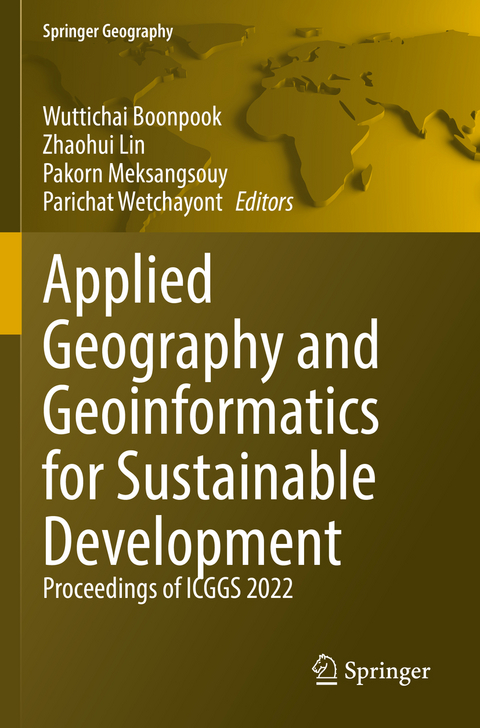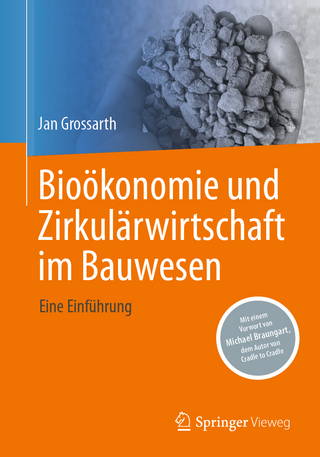
Applied Geography and Geoinformatics for Sustainable Development
Springer International Publishing (Verlag)
978-3-031-16219-0 (ISBN)
This volume presents the proceedings of the 2nd International Conference of Geography and Geoinformatics for Sustainable Development (ICGGS), held in Phuket, Thailand, April 7-8, 2022. The collection focuses on the importance of spatial thinking and planning by applying geography concepts and geospatial technology innovations in solving global problems such as environmental degradation, urban pollution, and climate change. The proceedings consist of case studies on wide-ranging spatial issues in developing countries, addressing challenges in mainstreaming sustainable development paradigms into their economies to improve natural resource and environmental management.
One of the main goals of the volume is to share and exchange different points of view regarding global, regional, and local spatial issues and how to use geography and geoinformatics for building resilience in multiple sectors, e.g., water, ecosystems, agriculture, and health. It offers the opportunity to learn about how geospatial concepts and technologies can contribute to environmental sustainability, while advancing education and research related to geography and geoinformatics. It will be a useful resource for students and researchers to initiate research ideas related to geospatial topics in regional and local scales.
Wuttichai Boonpook is a lecturer in Department of Geography, Srinakharinwirot University. He received his Doctor of Engineering from Beihang University. His research focused in the area of m deep learning semantic segmentation for remote sensing data, remote sensing and GIS applications, and UAV mapping.
Zhaohui Lin is the director at International Center for Climate and Environment Sciences and also professor at Institute of Atmospheric Physics, Chinese Academy of Sciences, China, where he received Ph.D. His main research interests include prediction of climate and hydrological disasters and also development of earth system model.
Pakorn Meksangsouy is an assistant professor at Department of Geography, Srinakharinwirot University. He received Ph.D. from University of Leeds. His research interests focused spatial interaction model for retail location planning, and geoinformatics application for socioeconomics.
Parichat Wetchayont is an an assistant professor at Department of Geography, Srinakharinwirot University. She received her Ph.D from Tohoku University, Japan. Her research focused on cloud microphysics, estimation of PM2.5 satellite, and study of climate change effects by using WRF model.
Chapter1. Flood Susceptibility Mapping Using a Frequency Ratio Model: A Case Study of Chai Nat Province, Thailand.- Chapter2. Influence of Hydrosphere Material Knowledge on the Attitude of High School Students in Conducting Water Conservation in Brebes Regency, Indonesia.- Chapter3. Optimizing multi-reservoir systems with the aid of genetic algorithm: Mahanadi reservoir project complex,Chhattisgarh.- Chapter4. Monitoring of Morphological Change in Lam Phachi River Using Geo-Informatics System.- Chapter5. Developing Scenario of Plastic Waste Leakage in Jakarta Hydrology Environment using Seasonal Data Condition and Socio-Economic Aspects.- Chapter6. Measurement of PM10, PM2.5, NO2, and SO2 Using Sensors.- Chapter7. Encoding Social Media Wording Indexes to Analyse PM2.5 Problem Perception.- Chapter8. Noise mapping of different zones in an urban area during Deepawali festival.- Chapter9. Digital Twins in farming with the implementation of agricultural technologies.- Chapter10. A cross-comparison between Rice Crop Monitoring System: GISTDA and International Asian Harvest mOnitoring system for Rice (INAHOR): JAXA.- Chapter11. Evaluation MODIS and Sentinel-2 data for detecting crop residue burned area.- Chapter12. Machine Learning Approach with Environmental Pollution and Geospatial Information for Mapping Poverty in Thailand.- Chapter13. Integration of Machine Learning Algorithms and Time-series Satellite images on Land Use/Land Cover Mapping with Google Earth Engine.- Chapter14. Sugarcane and Cassava Classification using Machine Learning Approach based on Multi-temporal Remote Sensing Data Analysis.- Chapter15. Google Earth Engine algorithm for Evaluating the Performance of Landsat OLI-8 and Sentinel-2 in Mangrove Monitoring.- Chapter16. Estimation of Aboveground Biomass and Carbon Stock using Remote Sensing Data for Sakaerat Environmental Research Station, Thailand.- Chapter17. Determination of Land Suitability for Oil Palm with Multi-Dimension Decision Support using Analytic Network Process (ANP) in Southern Thailand.- Chapter18. Land use change and ecosystem service variations in Huai Luang River basin, Udon Thani province, Thailand.- Chapter19. The Ability to Access Attractions for the Elderly from Public Transport in Bangkok Metropolis.
| Erscheinungsdatum | 12.12.2023 |
|---|---|
| Reihe/Serie | Springer Geography |
| Zusatzinfo | VI, 260 p. 119 illus., 111 illus. in color. |
| Verlagsort | Cham |
| Sprache | englisch |
| Maße | 155 x 235 mm |
| Gewicht | 415 g |
| Themenwelt | Mathematik / Informatik ► Informatik |
| Naturwissenschaften ► Biologie ► Ökologie / Naturschutz | |
| Naturwissenschaften ► Geowissenschaften ► Geografie / Kartografie | |
| Schlagworte | Applied GeographY • climate change • geoinformatics • Geospatial Technology • Remote Sensing • sustainable development |
| ISBN-10 | 3-031-16219-6 / 3031162196 |
| ISBN-13 | 978-3-031-16219-0 / 9783031162190 |
| Zustand | Neuware |
| Haben Sie eine Frage zum Produkt? |
aus dem Bereich


